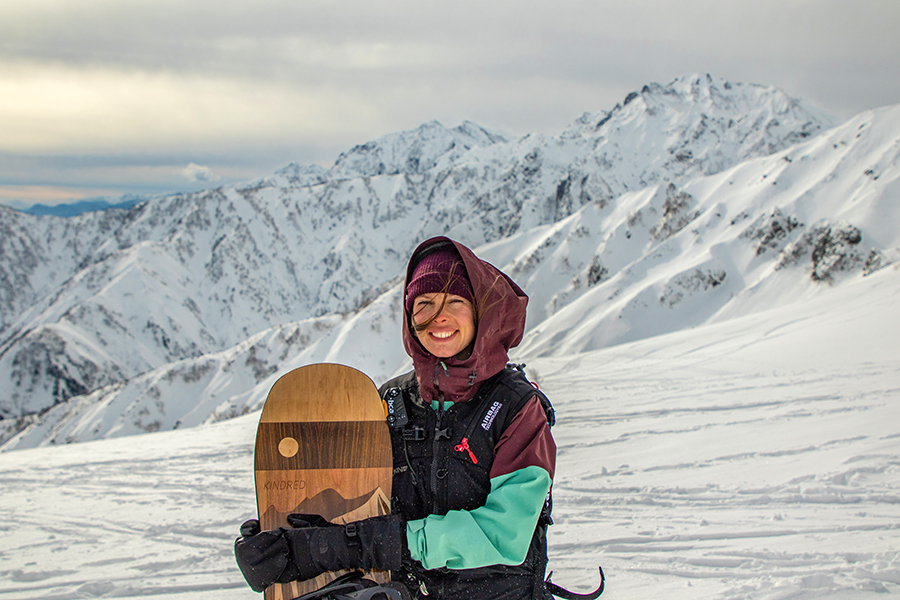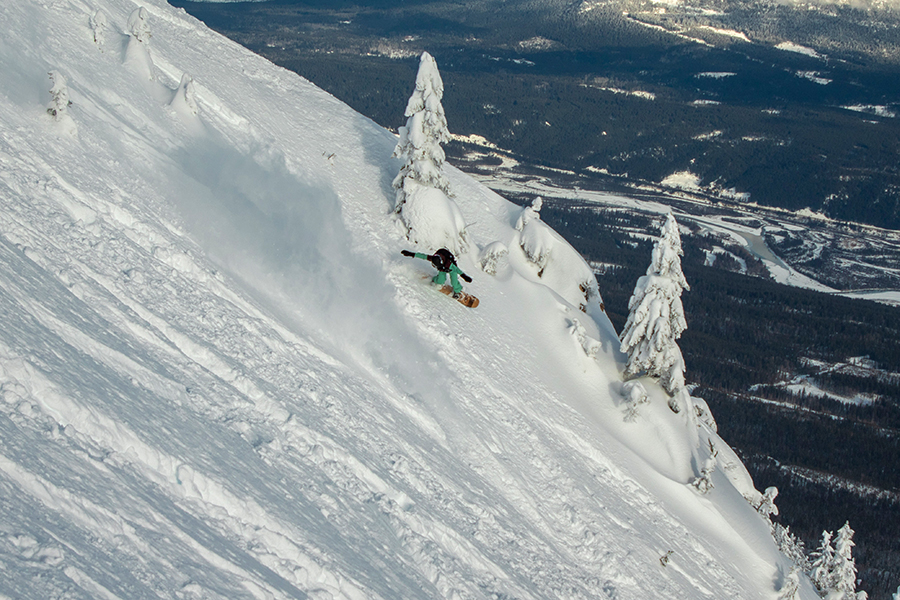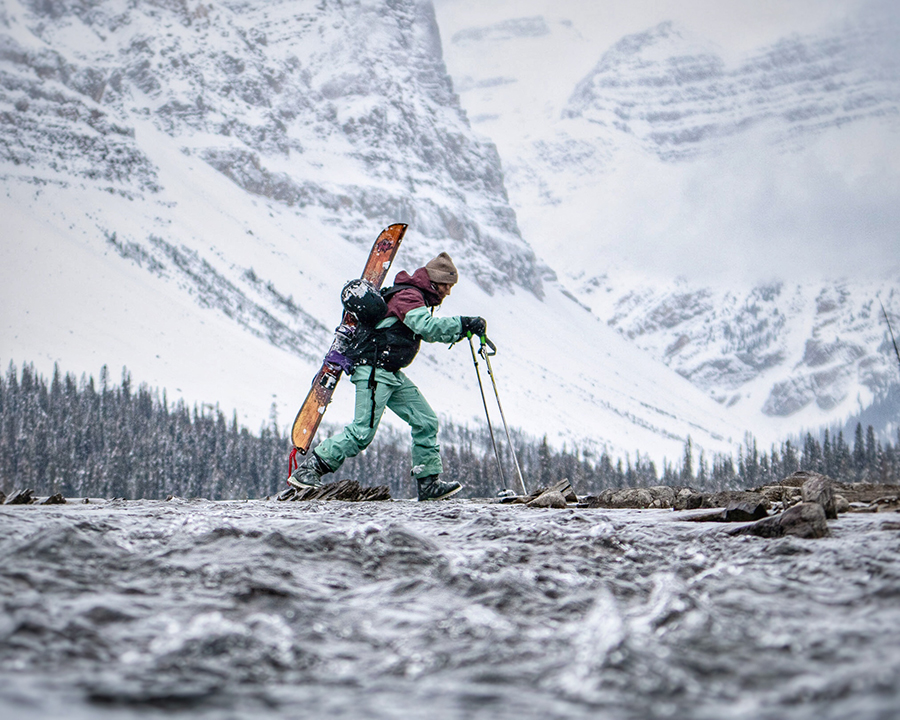“You trust your body and what you’re capable of”
At work and play, Niki Kelly loves a challenge. The bigger, the better in fact.
As a first-year Industrial Mechanic (Millwright) apprentice, Kelly (Landscape Architectural Technology ’13) is used to installing and dismantling some major machinery for companies in Alberta’s oil patch. It’s a career that not only allows her to work with her hands, which she loves, it gives her the freedom to pursue even bigger tests: snowboarding down some of the steepest slopes in the world.
We’re not talking your average black diamond runs either. Kelly, 31, is a world-class freerider, meaning she carves through fresh powder atop unspoiled mountain faces few of us ever get to see up close. There are no groomed runs – or even planned routes at all – and no practice trials.
“It offers the riders just so much creativity.”
Riders are transported to the top of a mountain face and it’s up to each to determine the best way down. Speed comes with the territory, but having the fastest time doesn’t crown a victor. Difficulty, control, technique and jumps are what counts when judging a run.
“It’s a pretty cool sport in that sense,” says Kelly. “It offers the riders just so much creativity. Whereas, you know, the Olympics are a little bit more structured. … You know exactly, ‘If I do this trick, it’s worth this many points.’”
Kelly’s push to summit her sport has come with several highs – many of them literal, atop mountain ranges on several continents – and, recently, a few bone-jarring lows. But, then, she’s never been one to walk away from an uphill battle.

Extreme origins
Freeriding has its origins in backcountry snowboarding, but it’s still a relatively recent concept when it comes to formal competition. The Freeride World Tour was created in 2008 to hold regional and world competitions in snowboarding and skiing throughout the year.
Unsurprisingly, a sport with such extreme roots attracts its share of daredevils, rebels and adrenaline junkies. Teenage rebellion is, in fact, what initially led a then 15-year-old Kelly to ditch skiing in favour of snowboarding – using her savings from babysitting on the sly to rent her first board on the slopes of Rabbit Hill.
“I really wanted to try it but it wasn’t really allowed,” she recalls. After visiting the mountains for the first time during her first year of post-secondary, she was hooked.
About four years ago, Kelly threw caution to the wind and gave freeriding a try, competing in qualifiers on the North American circuit. It was an opportunity to not only challenge her skills but to meet other “rad snowboarding chicks” and make new friends, she says.
In 2018 she became North American champion and in the process landed one of seven coveted spots on the Freeride World Tour.
“That’s kind of the Olympics. It’s the highest level that you can get to.”

Danger is awesome
The lack of practice runs means each rider has to scout the mountain in advance to determine her preferred route down. World Tour competitors are also given access to drone video footage
“I have to visualize it in my head over and over again,” Kelly explains.
She uses a combo of binoculars and a DSLR camera with a telephoto lens to take advance photos and videos to help her memorize the locations of cliffs, rocks and other potential dangers.
There might not be specific points for speed, but freeriding competitions are still lightning-fast – often spanning no more than a minute or two from peak to the finish at the bottom, an elevation change of about 500 metres. The risks to health and safety are very real, Kelly concedes, from going over a set of cliffs to triggering an avalanche (although organizers do their best to mitigate the latter).
Even a run with minimal mistakes comes with risk, she adds, recalling how one male rider landed on a rock and shattered his ankle. “Just bad luck,” she says. “There’s been a lot of injuries.”
“What if I make a wrong turn and put myself over 40 feet of rock?”
It’s little wonder that when Kelly first entered the sport her parents refused to listen to any details of her competitions. Even for herself and after years of competition, staring down the mountain – and mortality – requires some serious mental fortitude.
Pre-race meditation helps, she says. By focusing on something constant (in her case the bottom of her foot), she’s able to focus and push away all the disastrous what-ifs: “What if I fall? What if I miss that cliff? Or, you know, what if I make a wrong turn and put myself over 40 feet of rock?”
Once it’s her turn and the run begins, all thought gives way to 60 seconds of reaction and muscle memory. “You trust your body and what you’re capable of. You’ve got to be at your top for that minute.”
Fast rides and faster falls
Staying on top of the sport, however, is easier said than done. After spending much of 2019 riding down mountains in Japan, Austria, Andorra and Golden, British Columbia (the latter of which has become home), Kelly missed the cut to compete in the Freeride World Tour’s final event, Xtreme Verbier, in Verbier Switzerland, which features only the top four in both the male and female snowboarding and skiing categories.
That means Kelly is back to competing at North American qualifiers – in between her studies, of course, and travelling for work to sites across Alberta, including Syncrude’s Mildred Lake Mine in Fort McMurray. Being a millwright and “chasing shutdowns” in the spring and fall has its advantages, freeing up the winter months for school and snow.

The same free-spiritedness and desire to challenge herself that drew her to freeriding is also what sparked an interest in becoming a millwright. She enjoys the hands-on work, which speaks to her Landscape Architectural Technology past, but also the independence of being able to live and work where she wants since commuting to remote industrial sites is part of the job. The financial security doesn’t hurt either, nor does the fact that her husband, Mitchell Stagg (Millwright ’10) is in the business – and, like her, is an avid snowboarder. That means they work and play together, from job sites to mountain tops.
“It just fits all the checkboxes for me,” she says.
“You want to be pushed by the best.”
Kelly took advantage of a recent break from her studies to compete at the Freeride World Tour regional qualifier in Revelstoke, B.C. on Jan. 9 – her first shot at climbing back to the top. The results weren’t what she’d hoped as a “gnarly crash” off a set of cliffs put her near the bottom of the standings.
“It just didn’t work out this time.”
But Kelly isn’t willing to concede defeat. At least not when there’s fresh powder for the taking.
“I would like to get back to that level. I think that’s the whole point of competing. You want to be pushed by the best. Those girls on the tour, they’re rad.”